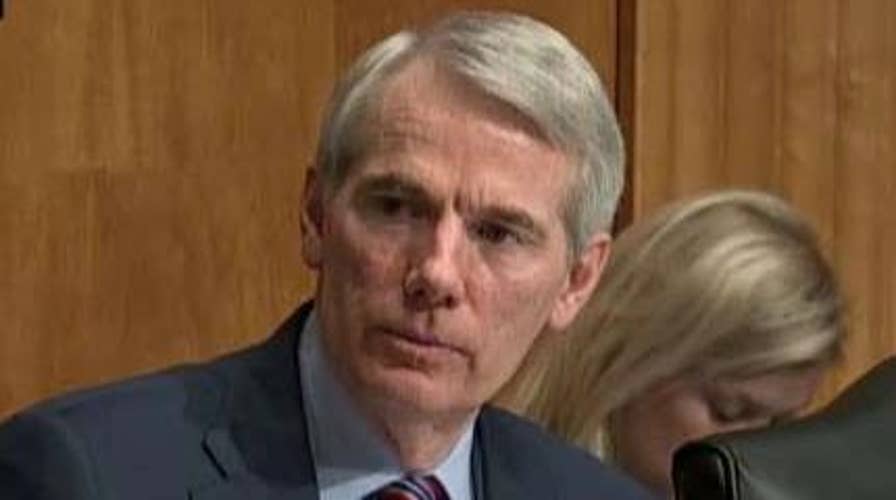Report: 12 of 23 ObamaCare co-op programs have failed
Rich Edson reports from Washington, D.C.
EXCLUSIVE: The dozen failed ObamaCare cooperatives have not repaid any of the $1.2 billion in federal loans they received and still owe more than $1 billion in additional liabilities, according to recent financial statements cited Thursday at a congressional hearing.
“We shouldn’t hold our breath on repayment,” Sen. Rob Portman, R-Ohio, chairman of the Senate Permanent Subcommittee on Investigations, said in his opening statement at the hearing.
“In some states, these losses will be absorbed by other insurance companies—which means, by the policyholders of other insurance companies who have to pay increased … premiums,” he said. “In other states, doctors, hospitals and individual patients stand to suffer large out-of-pocket losses due to the co-op failures—as our report details.”
Portman’s statement, first obtained by Fox News, refers to an investigation by the committee’s majority staff.
It claims the most recent balance sheets provided to the subcommittee show the failed cooperatives owe more than $700 million to doctors and hospitals for plan year 2015.
The failed cooperatives lost $376 million and exceeded the projected worst-case-scenario losses outlined in their loan applications by more than $260 million in 2014. They lost an additional billion dollars in 2015, according to the report.
“Once the co-ops got going in 2014, things went south in a hurry—both in terms of financial losses and enrollment figures that wildly deviated from the co-ops’ own projections,” Portman said. “Despite getting regular reports that the co-ops were hemorrhaging cash, HHS [the Department of Health and Human Services] took essentially no corrective action for over a year.”
Deloitte Consulting initially granted the cooperatives a passing grade based on an HHS-designed grading scale. However it added seven of the 12 had serious deficiencies in their enrollment strategy, according to the report. Others submitted budgets that were “incomplete, unreasonable, not cost-effective” and several “relied on unreasonable projections about their own growth.”
The report cited in Portman’s statement also claims that from 2014–2015, the administration lent an additional $848 million to the failed cooperatives, as they lost more than $1.4 billion.
In previous testimony, administration officials have told congressional panels that the administration scrutinized cooperative business plans and then placed them on corrective oversight when necessary.
“In 2015 we conducted 27 financial and operational reviews, 16 in-person visits, and had 43 formal communications,” Andy Slavitt, the acting administrator of the Centers for Medicare & Medicaid Services, told the Senate Finance Committee earlier this year. “Not to mention hundreds of phone calls. And we've kept the states up to speed on every important interaction to help inform their regulatory actions.”
When questioned how much money the government could salvage from the failed cooperatives, officials said they were only beginning to determine amounts.
“We are in the process of recouping that loan money right now,” said Dr. Mandy Cohen, the chief operating officer and chief of staff of the Centers for Medicare and Medicaid, last month to a House panel. “We’ll look at their excess revenue and then use all the tools available to us through their loan agreements and state and federal law to pull back federal tax dollars.”
ObamaCare provided $2.4 billion in federal loans to establish 23 non-profit cooperatives. A dozen failed and the administration has required eight of the remaining eleven to adhere to a “corrective action plan” designed to fix business flaws and prevent additional failures. The closed cooperatives account for $1.2 billion in federal loans.
Defenders of the law and cooperatives say these non-profit insurers operated in difficult markets and that it often takes years of financial commitment to build a viable business.
The failed cooperatives left hundreds of thousands of customers searching for a new insurance company. In some states, the loss was significant.
“HHS gave the New York co-op $90 million to prolong its financial life, rather than allow it to scale down, that co-op went on to lose another $544 million in 2015,” according to Portman’s statement, citing his staff’s report.
Former Secretary of State Hillary Clinton, the frontrunner in the Democratic presidential delegate count, pledged she would address the market void left by the failed cooperatives.
“We need to get more companies, more nonprofits, to fill this space. The ones that knew what they were doing have provided good services, but a lot of them have failed because they didn't have the right support,” she said Monday at a Democratic presidential forum hosted by Fox News.
“Even in those markets where those co-ops had previously operated, we have seen a commitment on the part of those who are administering the markets to try to facilitate greater competition,” said White House Press Secretary Josh Earnest. “And creating the co-ops was just one way to do that, but we certainly are going to be open to other ways to encourage other entities, private or public, to get engaged in this process.”
When previously questioned by Congress, administration officials declined to forecast how many of the remaining cooperatives would survive this year.
“The co-ops themselves are really the ones who are going to be the ones to determine whether or not they ultimately will be successful,” said Cohen. “They have a lot of work to do to rapidly mature their entities, their small businesses as you know and they’re still getting their foothold on this business.”













































